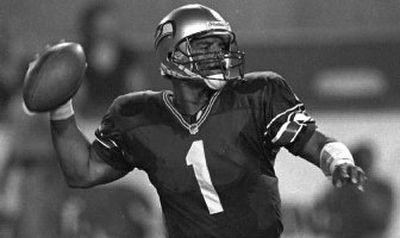Landmark selection

BILOXI, Miss. – Twenty-eight years ago, I sat in a rustic house in Massanutten, Va., with some high school buddies. Days before my final semester at Western Kentucky University, we were getting in some skiing before going our separate ways in pursuit of academic excellence. (Yeah, right.)
It was cold that January night, and there wasn’t any heat in the place.
But they had a black-and-white TV, and that was the important thing, because that was the day they played, in order, the Cotton Bowl, Rose Bowl, Sugar Bowl and Orange Bowl.
The BCS was a figment of Roy Kramer’s imagination.
Before we returned to the slopes, we saw Notre Dame wipe its feet on Texas in the first half of the Cotton Bowl. Alabama destroyed Ohio State in the Sugar Bowl, so that didn’t hold a lot of interest for five or six adolescents ready to party like it was 1999.
The Rose Bowl, however, offered some intrigue – in fact, a lot of it.
Washington quarterback Warren Moon, a guy I had barely heard of, was rolling out and giving Michigan fits. He had a cannon for a right arm.
He was quick and he was tough. He clearly had the respect of his teammates.
And he was black.
We’d already seen a handful of black quarterbacks, in college football and in the NFL, but they were rare. James Harris of the Los Angeles Rams. Joe Gilliam, who was Terry Bradshaw’s backup with the mighty Pittsburgh Steelers. NFL teams, however, were making a habit of drafting college quarterbacks who happened to be black and telling them they’d make a great defensive back or wide receiver.
Moon heard some of that after guiding Washington to a 27-20 upset of the Wolverines, and he made an end run on that front.
He went to Canada so he could play quarterback.
Six years later, I was working at a small daily newspaper about an hour’s drive from Houston, where Moon joined the NFL with a then-record five-year, $6 million contract. The Oilers were coming off a disastrous 2-14 season, but they hired Moon’s CFL coach, Hugh Campbell, and Moon followed suit.
The Oilers threw a big press conference, and Moon couldn’t have been more accommodating. Race never should have been an issue in the first place, but Moon was intent on taking the high road.
He just wanted to play quarterback. And he definitely knew how to play quarterback.
All he needed was a chance.
Today, Warren Moon becomes the first black quarterback to be inducted into the Pro Football Hall of Fame.
He will be joined by another quarterback, Dallas Cowboys legend Troy Aikman, along with New York Giants linebacker Harry Carson, the late Reggie White, Cowboys offensive lineman Rayfield Wright and John Madden, who was a pretty fair coach with the Oakland Raiders long before Madden 2007 was on the shelves of Toys ‘R’ Us.
But Moon represents a breakthrough. He’s the first black quarterback to be immortalized with a bust in the landscaped grounds of Canton, Ohio, and he’s going to be the first of many.
Moon told the Akron Beacon Journal that his moment in the sun “legitimizes the fact that, even though I don’t think it needs to be said any more, that black quarterbacks can play this game at a very high level.”
Moon, who works in the radio/TV booth these days with the Seattle Seahawks, was cruising through Detroit earlier this year when he learned he’d been a first-ballot selection for the Pro Football Hall of Fame on the radio. He shared his thoughts of that experience with the Fort Worth Star-Telegram’s Ray Buck.
“I didn’t almost drive off the road,” Moon said, “but my wife did take the wheel and steer the car until I got myself back together. I was overcome with emotion.”